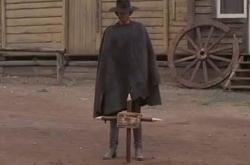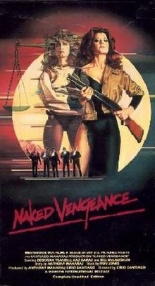
 It’s just not Carla Harris’ week. First, before their anniversary dinner is even digested, her husband is killed trying to save a woman being attacked in the L.A. restaurant’s parking lot. Second, after moving back to Silver Lake to live with Mom and Dad, she’s sexually assaulted by six guys in her own living room. Third, one of those blue-collar assholes shotguns her parents to death when they interrupt the party.
It’s just not Carla Harris’ week. First, before their anniversary dinner is even digested, her husband is killed trying to save a woman being attacked in the L.A. restaurant’s parking lot. Second, after moving back to Silver Lake to live with Mom and Dad, she’s sexually assaulted by six guys in her own living room. Third, one of those blue-collar assholes shotguns her parents to death when they interrupt the party.
Once Carla emerges from a state of shock, it’s time for some vengeance: Naked Vengeance.
From Roger Corman’s Concorde Pictures and Filipino exploitation legend Cirio H. Santiago (Death Force, Vampire Hookers, et al.), Naked Vengeance gives Deborah Tranelli of TV’s Dallas her only film role, and damn, it’s a meaty one — the kind of meat whose second name is spelled M-A-Y-E-R, but meat nonetheless.
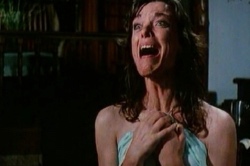 Her Carla is an actress whose career never took off beyond a dog food advert, so returning home a widow is doubly humiliating. In her absence, it appears every Silver Lake male who’s not her father — the gardener, the bartender, the grocery butcher, the car mechanic, even the ice deliveryman — has become a walking, mouth-breathing example of the “unwanted behaviors” section from your HR department’s anti-harassment policy.
Her Carla is an actress whose career never took off beyond a dog food advert, so returning home a widow is doubly humiliating. In her absence, it appears every Silver Lake male who’s not her father — the gardener, the bartender, the grocery butcher, the car mechanic, even the ice deliveryman — has become a walking, mouth-breathing example of the “unwanted behaviors” section from your HR department’s anti-harassment policy.
They’re also close buds who drink together, lift weights together (one in a Garfield T-shirt), bowl together (for the Farm Fresh league) and, yes, rape together. For the kind of movie in which a cop uses a flashlight outside on a sunny day, the scene of the group attack is Carla is harrowing … and then nearly self-parodic, because Santiago — like his villains — doesn’t know when to stop. The viewer’s sympathy for Carla quickly morphs into embarrassment for Tranelli.
Because this is also the kind of movie in which the sheriff (Bill McLaughlin, Santiago’s Silk) is unwilling to take action, Carla does. Call it My Shoulder Pads and I Spit on Your Grave. Tranelli commits to her vigilante role in the rather enjoyable, yet unoriginal rape-revenge pic as if it were a drama opening on the Great White Way. Among the actors portraying her dirty half-dozen of abusers, only Kaz Garas (Steve Trevor from the 1974 Wonder Woman TV-movie) turns in a performance that, if not grounded, at least doesn’t float any higher than a month-old helium balloon; the other guys emote with bulging eyes, unnatural motion and raised voices, as if they were being mo-capped for a cartoon that never got made. One wishes shelved status also awaited the movie’s theme song, the Tranelli-warbled power ballad “Still Got a Love,” which we hear about three times too many. —Rod Lott

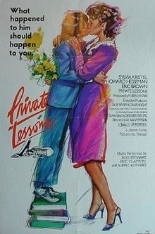
 You never realize just how sleazy most Rod Stewart tunes are until they’re used as the backdrop for the seduction of a teenage boy; I know this not from personal experience, mind you, but from the fact that the filmic wet dream
You never realize just how sleazy most Rod Stewart tunes are until they’re used as the backdrop for the seduction of a teenage boy; I know this not from personal experience, mind you, but from the fact that the filmic wet dream 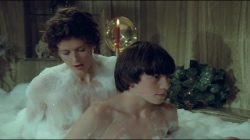
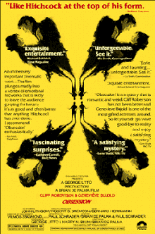
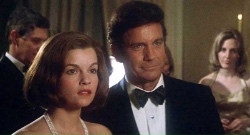
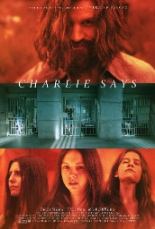
 I think that, if I was born a couple of decades earlier, I would have been a pretty good hippie cult leader, you know, minus all the murder; just me and a bunch of groovy runaways, kicking back on a deserted movie set and eating out of dumpsters while trying to reach universal oneness … sounds like far-out time to me.
I think that, if I was born a couple of decades earlier, I would have been a pretty good hippie cult leader, you know, minus all the murder; just me and a bunch of groovy runaways, kicking back on a deserted movie set and eating out of dumpsters while trying to reach universal oneness … sounds like far-out time to me.
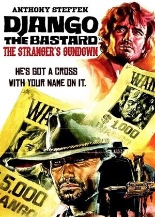
 In all the dusty annals of the mythical Western genre, if there was ever a true bastard to tame the Wild West, it was apparently
In all the dusty annals of the mythical Western genre, if there was ever a true bastard to tame the Wild West, it was apparently 